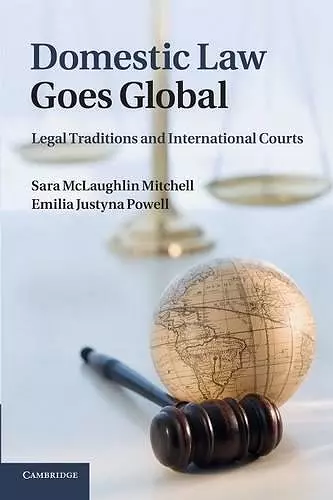Domestic Law Goes Global
Legal Traditions and International Courts
Sara McLaughlin Mitchell author Emilia Justyna Powell author
Format:Paperback
Publisher:Cambridge University Press
Published:5th Dec '13
Currently unavailable, and unfortunately no date known when it will be back

This book examines how domestic legal traditions influence states' commitments to international courts.
This book examines how countries' domestic legal traditions (civil law, common law, Islamic law) influence their willingness to support international courts, such as the International Court of Justice or the International Criminal Court.International courts have proliferated in the international system, with over one hundred judicial or quasi-judicial bodies in existence today. This book develops a rational legal design theory of international adjudication in order to explain the variation in state support for international courts. Initial negotiators of new courts, 'originators', design international courts in ways that are politically and legally optimal. States joining existing international courts, 'joiners', look to the legal rules and procedures to assess the courts' ability to be capable, fair and unbiased. The authors demonstrate that the characteristics of civil law, common law and Islamic law influence states' acceptance of the jurisdiction of international courts, the durability of states' commitments to international courts, and the design of states' commitments to the courts. Furthermore, states strike cooperative agreements most effectively in the shadow of an international court that operates according to familiar legal principles and rules.
'This book is one of the few concrete manifestations of the multiple calls to marry social science methods and international relations scholarship with international legal study. Rather than philosophical analysis or normative statements, the authors provide causal arguments and back them up with systematic empirical evidence - a real advance in the field.' Paul F. Diehl, Henning Larsen Professor of Political Science, University of Illinois
'Mitchell and Powell make a major contribution by showing how current international law and international relations reflect the complex interactions of three different legal traditions. Equally important, they generate a sophisticated theory and analysis of the differences between the incentives, opportunities, and behaviors of the states that create international institutions and those that join those institutions after they are created. This work is important reading for scholars of both international law and international relations.' Ronald B. Mitchell, University of Oregon
'This is an exciting and original contribution to understanding ways that domestic politics and institutions influence international relations. Using lay language but rigorous methods, Mitchell and Powell show that states struggle to influence international legal institutions to reflect their own legal traditions. These scholars point out that modelling international courts on domestic legal systems serves to reduce the perceived uncertainty states face when they delegate adjudicative powers to such courts. Theirs is a new and powerful argument, and it will stimulate valuable debate about why it is that states prefer to create and join international institutions in their own image.' Beth A. Simmons, Clarence Dillon Professor of International Affairs, Harvard University
ISBN: 9781107661677
Dimensions: 229mm x 152mm x 15mm
Weight: 380g
278 pages